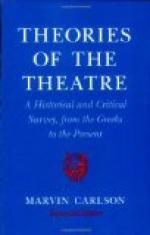VII
THE FOUR LEADING TYPES OF DRAMA
I. TRAGEDY AND MELODRAMA
Tragedy and melodrama are alike in this,—that each exhibits a set of characters struggling vainly to avert a predetermined doom; but in this essential point they differ,—that whereas the characters in melodrama are drifted to disaster in spite of themselves, the characters in tragedy go down to destruction because of themselves. In tragedy the characters determine and control the plot; in melodrama the plot determines and controls the characters. The writer of melodrama initially imagines a stirring train of incidents, interesting and exciting in themselves, and afterward invents such characters as will readily accept the destiny that he has foreordained for them. The writer of tragedy, on the other hand, initially imagines certain characters inherently predestined to destruction because of what they are, and afterward invents such incidents as will reasonably result from what is wrong within them.
It must be recognised at once that each of these is a legitimate method for planning a serious play, and that by following either the one or the other, it is possible to make a truthful representation of life. For the ruinous events of life itself divide themselves into two classes—the melodramatic and the tragic—according as the element of chance or the element of character shows the upper hand in them. It would be melodramatic for a man to slip by accident into the Whirlpool Rapids and be drowned; but the drowning of Captain Webb in that tossing torrent was tragic, because his ambition for preeminence as a swimmer bore evermore within itself the latent possibility of his failing in an uttermost stupendous effort.




